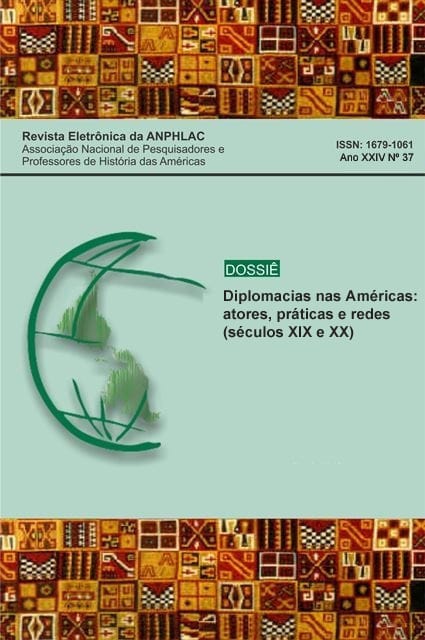An Intellectual at the service of the United States hegemony
Lincoln Gordon and the Alliance for Progress in Brazil – a case study
DOI:
https://doi.org/10.46752/anphlac.37.2024.4166Palabras clave:
Alliance for Progress, Lincoln Gordon, organic intellectual, hegemonyResumen
This investigation aims to analyze the performance of Lincoln Gordon, Brazilian ambassador in the early 1960s and a key player in the Alliance for Progress, as an intellectual articulator of strategies to defend the international interests of the United States in Latin America, during the Cold War. Our research effort is to demonstrate how Gordon made use of the Alliance for Progress as a political instrument for the dissemination of the American political and economic culture and the consolidation of Washington’s hegemony. For such a purpose, we follow the concepts of hegemony and organic intellectual proposed by Antonio Gramsci. Our main source of examination is the book “O Progresso pela Aliança”, published by Gordon himself in 1962 targeting the Brazilian public and aimed at propaganda of the foreign aid program, suggesting the existence of mutual interests between Brazil and the USA, which would facilitate the Alliance’s success in the country, hence the defense of the territory against Soviet socialism. Through a critical and detailed analysis of this material, we came to the important conclusion that Gordon played a crucial role in consolidating the Alliance for Progress in a modernization program linked to the need to create paternalistic relations between the US and Latin American countries, developing American liberal capitalist logic, the system of ideas that defines Gordon’s class position.
Descargas
Citas
BELMONTE, L. A. Selling the American way: U.S. propaganda and the Cold War. Pensylvania: University of Pensylvania Press, 2010.
FICO, Carlos. O Grande Irmão: da operação Brother Sam aos anos de chumbo – O governo dos Estados Unidos e a ditadura militar brasileira. Rio de Janeiro: Civilização Brasileira, 2008.
GIGLIO, J. N.; RABE, S. G. Debating the Kennedy Presidency. New York: Rowman & Littlefield Publishers, 2003.
GRAMSCI, Antonio. Americanismo e fordismo. São Paulo: Hedra, 2008.
GRAMSCI, Antonio. Cadernos do cárcere. Rio de Janeiro: Civilização Brasileira, 1999.
HOGAN, Michael J. The Marshall Plan: America, Britain, and the reconstruction of Western Europe, 1947-1952. Cambridge: Cambridge University Press, 1987.
LARA, José V de. Revolução às margens do capitalismo: a Aliança Para o Progresso no Nordeste do Brasil, 1961-1964. Dissertação de Metsrado. Maringá: UEM, 2019.
LIMA, Beatriz M. (2021). O Ministro das Relações Exteriores como intelectual orgânico: formulação e direção. In: MATHIAS, Meire (Org.). Nexos Latinos. São Paulo: Lutas Anticapital, 2021, p. 293-326.
LIMA, Beatriz M. O papel do intelectual orgânico na construção da política externa brasileira: diferentes perspectivas para a América Latina (2001-2010). Dissertação de Mestrado. Maringá: UEM, 2020.
MUNHOZ, Sidnei J. Guerra Fria: história e historiografia. Curitiba: Editora Appris, 2020.
PACKENHAN, R. A. Liberal America and the Third World: political development ideas in foreign aid and Social Science. Princeton: Princeton University Press, 1973.
RIBEIRO, Ricardo A. As origens da Aliança Para o Progresso. In: SRAINE, A. (Org.). Estado, desenvolvimento e políticas públicas. São Paulo: Editora Unijuí, 2008, p. 319-362.
SMITH, B. L. R. Lincoln Gordon: Architect of Cold War Foreign Policy. Kentucky: University Press of Kentucky, 2015
Descargas
Publicado
Cómo citar
Número
Sección
Licencia
a. Cessão de direitos autorais
Venho, por meio desta, ceder em caráter definitivo os direitos autorais do artigo "____________", de minha autoria, à Revista Eletrônica da ANPHLAC e afirmo estar ciente de que estou sujeito às penalidades da Lei de Direitos Autorais (Nº9609, de 19/02/98) no caso de sua infração. Autorizo a Revista Eletrônica da ANPHLAC a publicar a referida colaboração em meio digital, sem implicância de pagamento de direitosautorais ou taxas aos autores.
b. Declaração de ineditismo e autoria
Atesto que o artigo ora submetido à Revista Eletrônica da ANPHLAC, intitulado "________________________", de minha autoria, nunca foi publicado anteriormente, na íntegra ou em partes, dentro do país. Vindo a ser publicado na Revista Eletrônica da ANPHLAC, comprometo-me a não republicá-lo em qualquer outro veículo editorial.






